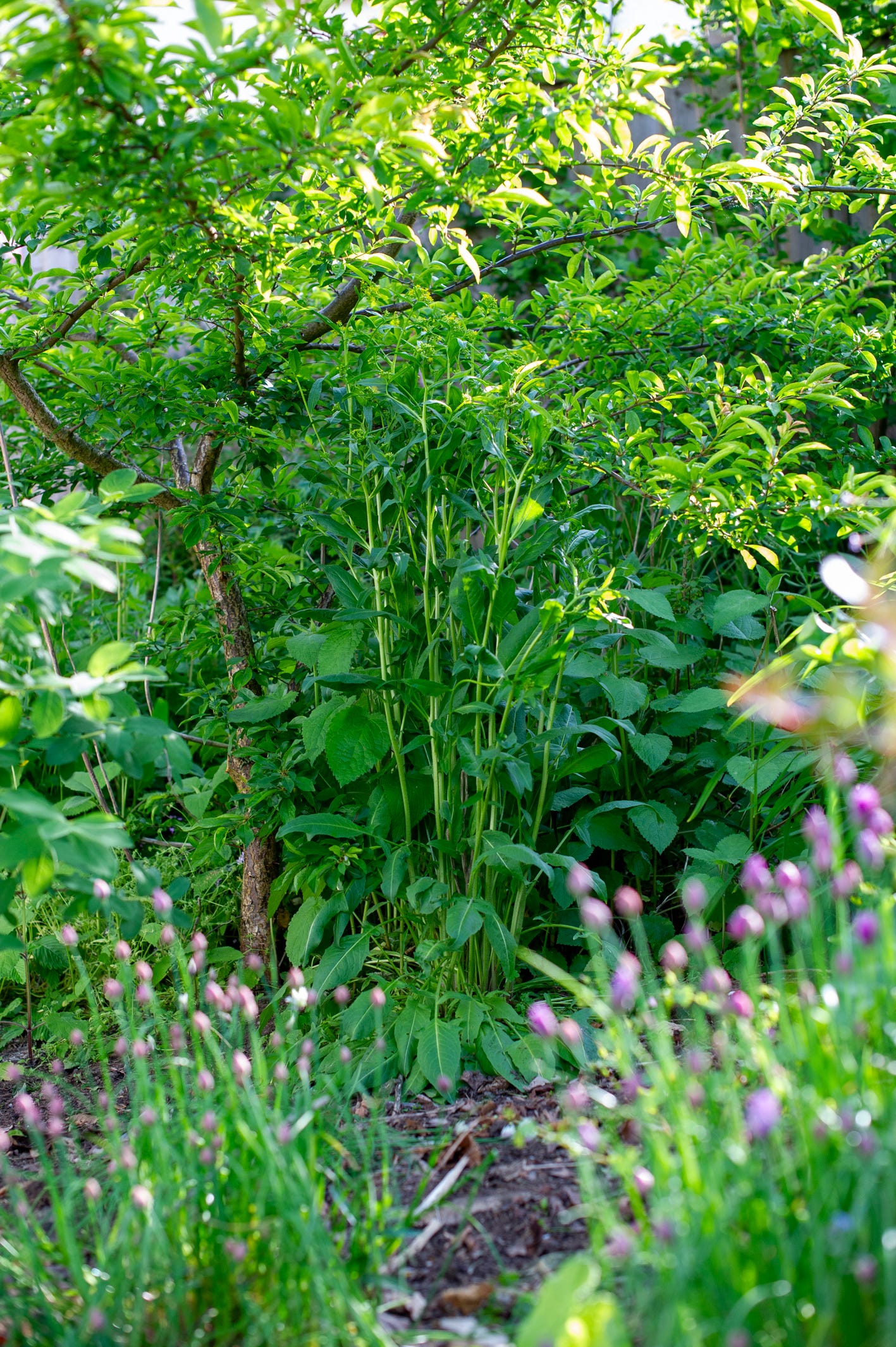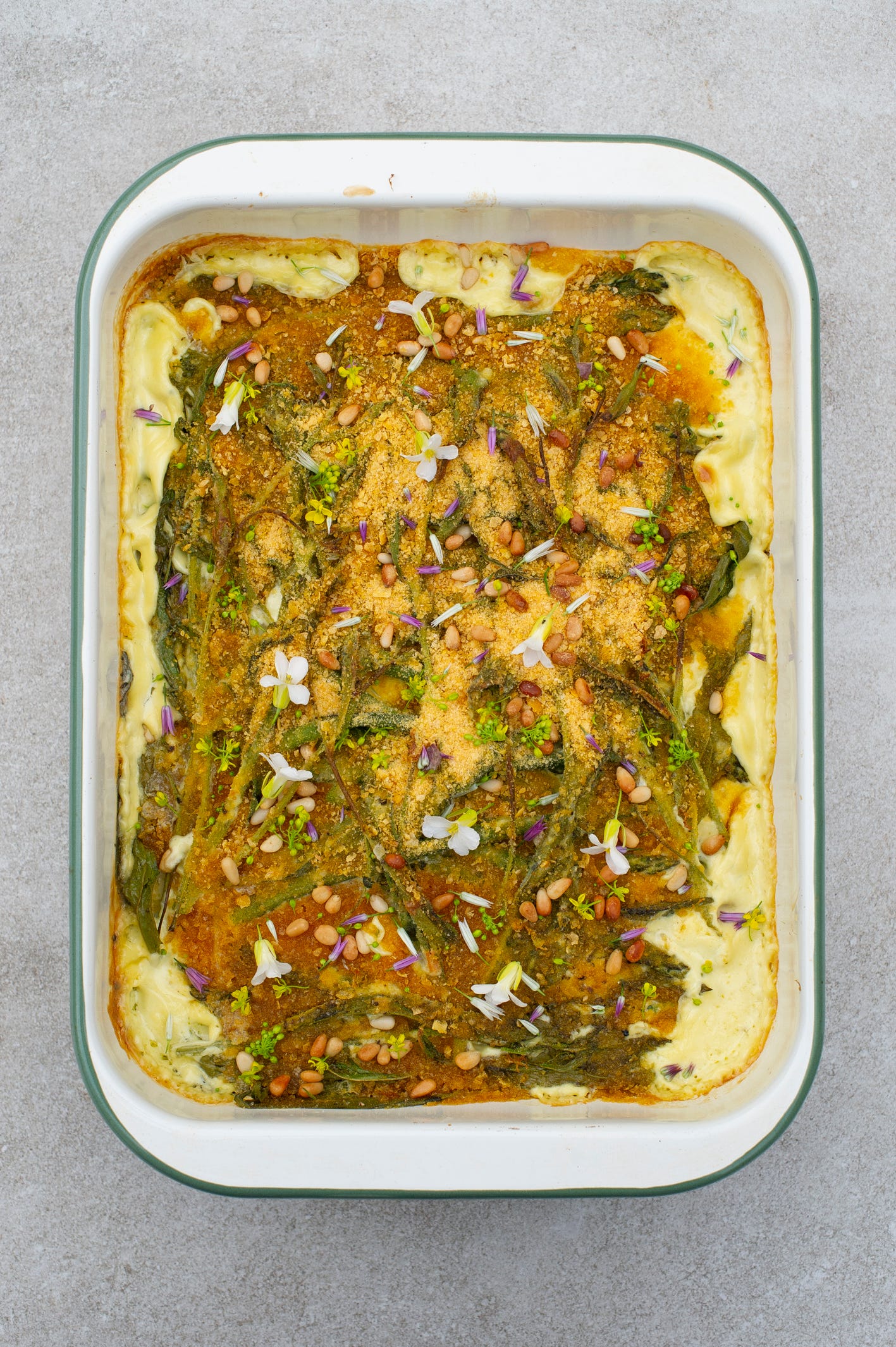The third stair, shortbread, Turkish rocket, and a shallow creamy, crunchy gratin
Abundance: Sun 25 May 2025
25 years ago, the old man’s 64 years, 11 months and 12 days came to a gasping close in the cool of late spring Devon, on the third stair of the council house where he’d spent the second half of his life.
A succession of decisions taken and not, of sliding doors open and closed, of advice followed and ignored, his twin addictions of nicotine and war: all had come to a stop.
Today, I drove past that house - the place I called home for all but the first week of my childhood.
I think about him less often these days, but he still shows up often enough - largely unannounced - when I’m cooking, walking, driving somewhere unrelated, or - still - when I reach to call him when the cricket is going well.
Ten years after he died, I had the urge to write about the day, partly, I think, so that I might not lose it to the tide of time. At that point, I don’t think I appreciated that writing can not only help you understand the world and your place in it, but it can reveal things previously hidden to your conscious brain. I’m not sure I would have remembered that day so well had it not been for following that unexpected urge to write about it, and seeing what came out.
When I’d finished with the page, I realised I’d not told anyone - and had even managed to erase it from my mind for a decade - that something I don’t believe in had actually happened.
Twenty five years is both an age and a sneeze: my life was very different then - before writing, a child, marriage, growing some of what I eat, and these were the days we still mostly called up a building in the hope that the person we wanted to speak to was in it - and yet a single song can draw me back to those times and how they felt in a second.
And so here are the words that fell out of me 15 years ago, 10 years after he died.
From 25 May 2010
Ten years ago I was living in Winchester, having moved back there from London as a temporary base to get my mind clear. It’s a great town. It feels like you’re living in Sunday-night-8pm-on-TV land. Beautiful water meadows nudging almost right up to the cathedral in the centre of town – you can walk from its door past old pubs full of lively chatter, top beer and applewood smoke, out into water meadows, past the school cricket pitches and into open countryside with grass under your feet almost the way. It feels sort of suspended from the rest of the world, not quite real. It was perfect as a haven to regroup.
That late-spring was spent surveying the landscape of Suffolk; another day in the lovely Suffolk sun, surveying some of the incredible coast around Orford, stunning seafood and other treats from the smokery very happily consumed. Friday always meant a run for the early train, heavy bag from a midweek away over your shoulder. A two-train trip into Liverpool St, followed by a bus to Waterloo, for the train out to Winchester. It was a beautiful afternoon – May in England, if the Gods get it right, is hard to beat. Hot but bearable, a little breeze, and everything green, not yet browning after too many days of summer.
I love London, especially in sunshine, and a bus beats the tube any day. It was perhaps 3.30 and it felt good to be heading home in time to have a proper evening.
I must phone Dad, I thought. Only I hadn’t thought it – I’d rationalised a weird feeling into that thought. I had a wave of something, of knowing something wasn’t as it had been before. An irrational, impossible realisation that something had changed. Not wanting to take myself as mad, I thought: ‘I must phone Dad’.
I made the connection at Waterloo and got hungry on the train. A packet of ready-salteds and a couple of shortbreads took the edge off but the jitters were still there, very lightly not allowing me to ignore them.
I walked across town from the station, past Winchester Cathedral where I’d picked up my degree certificate 5 years previously, and I started to run. I pulled myself up short and walked again: run and you are admitting you believe this irrational feeling. But I wanted to run – by running and believing that feeling I felt I was somehow inoculating myself against it being real. Run and I was the idiot who ran home, phoned his dad and everything was fine.
I walked through the lanes and up to the house I shared up near where the water meadows began. The second half of that walk probably hadn’t altered much in the last 80 years, thanks largely to Winchester School who own most of that part of the city.
I got in. Just past 6 and I was starving. I phoned Dad, something I never did before eating. After 20 years or so of having a generally hard time being father and son our relationship had shifted. I stopped being a teenager and had the luck to meet someone who understood our relationship rather more than I did. I felt like I’d started to understand why he was so (as I saw it) impossible and why I might be headed down that road if I wasn’t careful. It opened a door. I realised I was no longer the child, or at least only the child, and that with him getting older and the impact of being alone more apparent, I was, for want of a better phrase, more powerful, no longer needing to run from a sense of threat. Bridges were built, we laughed a bit, we talked more. But it never made sense to call him on an empty stomach – I always had to let a few of the old annoyances go during any conversation and it was always much harder not to bite if I was hungry.
It was also his 65th birthday in 3 weeks and I still hadn’t hit on the present yet. He’d always wanted to be a pilot but colour-blindness had put an end to his dream, but a flying lesson over the coast where he lived was about as good as a present could get as far as he was concerned but I’d blown that one on his 60th. I had intended to wait to call until I’d decided on a present so that I could organise coming down to see him.
It was good being able to ring him – he’d only recently allowed me to get him a phone put in. We’d had one when I was a kid for a couple of months but money was tight and it went. When he’d left hospital after his first heart attack 18 months earlier, I’d managed to convince him to have one, but only by making out it was for my benefit – to stop me having to worry about him walking around the block to the payphone in all weathers.
I dialled the number, glad to be able to rid the weird feeling. No answer. Ok, he’ll be walking to the post box to send a few letters. I put the kettle on, sat down and rang again. I heard a strange noise: it was me, saying, aloud in an empty house “Pick up the phone Dad”.
It rang. I said it again. I put the phone down, threw a tea bag in a cup, poured in the water and rang again. “Pick up the phone Dad.” “Pick up the phone Dad and don’t be dead.”
I kept saying it, thinking it would be funny when he picked it up and caught some part of the line. Hoping that by saying it it made the reality of it less possible. I would tell him the ridiculous story of having that feeling when crossing London on the bus.
No answer. I put the phone down, took the tea bag out, poured in a little milk, sat down and rang Mum. If anything had happened she’d know, even though they’d not shared a word since the divorce 23 years before.
Engaged. I rang again, engaged, I rang him again, no answer. I put the phone down and lifted it to ring Mum: the beeps of a message received on my phone. That’ll be Mum, telling me Dad’s dead, I thought.
It was my mum, trying to do an ‘everything’s ok’ voice:
“Hi love, can you give me a call as soon as you get back in.”
The week or so between a death and the funeral is a very particular time. I don’t think I’ve ever felt more alive – at least in the sense that for that time, for once, life had no fluff, it was tight and essential. At the same time everything was unreal; in it’s truest sense, unusual.
Going through his things, I took his coat off the peg and inside I found a packet of cigarettes. Even with his fear of hospitals he hadn’t been able to stop smoking for long after his first heart attack, but he kept it secret. I was furious with him but wanted to hug him for his weakness.
Ten years has flown, and life is almost entirely different, at least in its ingredients. For all the missing him and still reaching for the phone to call him when the cricket’s gone well, nothing has had a more positive effect on me than him dying. Everything before then had felt vaguely undoable, put-rightable. That day I realised, truly, for the first time, that there is only so much time, that it is all temporary. I had never even grown a lettuce when he died, now I kill olives for a pastime. I think that’s a good thing. And tomorrow I’ll get back to writing about it.
Asparagus and Turkish rocket gratin
Beneath the Japanese plum, beneath the blue honeysuckle, beneath the daylilies, in front of the garlic chives, in front of the broadleaved thyme, in front of the Chilean guava, a clump of Turkish rocket is reaching for the sky. As well as its wide rocket-flavoured leaves, the flower stalks - broccoli-like in looks - are, until today, an unknown kitchen pleasure. I’d had the odd nibble out in the garden, but never cut them like lanky sprouting broccoli to cook with. At least part of not cutting them before is me liking the look of any plant throwing its arms to the sun, and would rather let them do their thing, but today I wanted to eat something I’d never eaten before, simple as that. If you don’t have Turkish rocket, and few do, either use the same weight of quickly blanched, roughly chopped sprouting broccoli or calabrese broccoli, or a good few handfuls of rocket. This isn’t a deep, sumptuous gratin - it’s more of the creamy, crunchy delight to go with sausages, a piece of white fish, or some wedges of fried little gems.
300g asparagus, tough base snapped off
300g Turkish rocket stems
a small handful of thyme, leaves only, finely chopped
Zest of one lemon, finely grated
250ml double cream
1 clove of garlic, peeled and finely grated or chopped
3 tbsp olive oil
a generous handful of panko breadcrumbs
a handful of pine nuts
Salt and pepper to taste
Chive flowers. optional
Serves 4 as a side dish
Preheat oven to 200°C/180°C fan.
In a small saucepan, stir the thyme, garlic and a good scrunch of salt and pepper into the cream. Warm over a low flame until just at the boil, then remove from the heat.
Blanche the asparagus in a saucepan of boiling water for two minutes, then submerge in very cold water to retain the colour, and drain.
Arrange the asparagus on the base of a shallow dish, then the rocket over the top and sprinkle with lemon zest. Pour the cream over the top. Scatter with an evenish layer of breadcrumbs. Drizzle with olive oil. Season well and bake in the oven for 20-25 minutes.
Remove from the oven, allow to cool a little, and just as you serve, scatter with chive flowers, and/or whatever else takes your fancy - these are from two types of chive, kale flowers, and a few broken up flower buds from the Turkish rocket.









I'm adding Lesley's really beautiful post, to make it easy for anyone interested to find it
https://substack.com/home/post/p-164536335
Oh, Mark. I'm so heartbroken reading this. I know that's not your intention but the tears have just come, and I feel every word. I often wonder how long it takes for grief to leave us. I'm not sure it ever can. But if all you've done and become since your dad's passing is all the better then your life is well-lived. As you say, we don't know how long we've got. Thank you for letting us in. Such beautiful evocative writing.
Frances